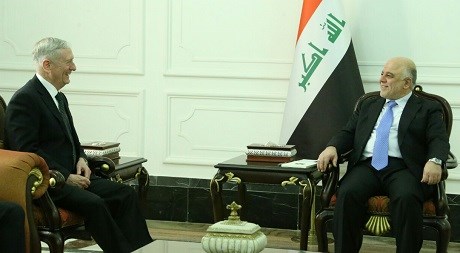(AhlulBayt News Agency) - The Marines retired general James Mattis, who was picked as Secretary of Defense in Trump’s administration, in a surprise visit arrived in Baghdad on Tuesday February 21. This trip is the first official visit to Iraq of one of top officials of administration of the new US President Donald Trump.
The travel to Baghdad and meeting with the Iraqi political authorities took place while Iraq since late 2013 has been busy fighting ISIS as the biggest and most brutal terrorist group of the 20th century, and at the same time only two days have passed since the joint Iraqi forces launched operation to recapture the west of ISIS-held Mosul.
Mattis, also known as Mad Dog, has visited Baghdad a day after he attended Munich Security Conference and met with Masoud Barzani, the president of Iraq’s Kurdistan region, and Iraq's Prime Minister Haider al-Abadi. This issue lays bare the new American political team’s sensitivity to Iraq and that it wants to, in any possible way, take a role in the country’s future once ISIS terrorist group is obliterated there. Following are three reasons behind Trump's key advisor to Baghdad.
1. Sending message of US obsession with Iraq.
James Mattis's Baghdad visit and meeting with PM Haider al-Abadi can be seen as part of an effort to pass to Iraq a significant political signal, telling the Iraqis that the new White House administration is showing a special sensitivity to the Iraqi developments and the future of war with ISIS. In fact, Trump and some of regional leaders who are apparently puppets of Washington in the region in the past few months issued allegations against Iran, claiming that Tehran was controlling the Iraqi government. Actually, Mattis’s trip to the Iraqi capital can carry a warning to the Baghdad government, telling it that it needs to know that Washington is sensitive about Iraq’s future and wants to take a more active role in this terror-hit country.
Meanwhile, PM al-Abadi’s words during his talks with Trump’s defense chief were very attention-getting. They apparently can be interpreted that he in advance was aware of the intentions behind the US official’s trip. In a preemptive step, al-Abadi said that the international support for Iraq in its battling of ISIS was crucial. He added, however, no foreign troops are fighting in Iraq and only military advisors are contributing to the operation. The Iraqi leader continued that all involved forces are from Iraq and the gains are being made by the Iraqi forces. He highlighted Iraq’s potentials to beat ISIS, emphasizing that Iraq is now in decisive junctures of assault to liberate the country’s occupied cities.
Making these remarks signals that the Iraqi PM wanted to send an early message to the American defense secretary to tell him that just contrary to Washington’s Iranophobic propaganda campaign in the region Iran has no direct military involvement in Iraq and Tehran plays role of an advisory force in battle. Generally, Mattis’s surprise visit to Iraq more than any other thing was associated with Trump and his team’s worries about Iran’s active role in a post-ISIS Iraq.
2. Seeking ongoing and expanded military presence in Iraq
Still, another drive for Mattis's visit was the US struggle to get enough guarantees from Baghdad’s officials about continued and increased military presence in the country. In addition to assuring the Iraqi officials about persistent cooperation with Iraq’s military in fight against ISIS, Secretary Mattis reiterated his country's "full support to Iraq in its war against terrorism, pointing out that his visit was aimed at supporting Iraq and to emphasis his country's attitude to continue the good relations and support to Iraq after (defeat of) ISIS,” a statement published by Iraqi PM’s press office suggested.
But these words confirm Trump's tweets that blamed former President Barack Obama’s administration for withdrawal from Iraq and spending big American money on Iraq. The speculations suggest that Washington is to position forces at Gyiara air base in south of Nineveh province once Mosul is liberated from ISIS terrorists and take its budget from Iraq’s federal budget under the excuse of providing the country’s security. All in all, Mattis’s trip substantiates the US motivations for ongoing military presence in Iraq after ISIS removal.
3. Whitewashing Trump’s Iraq oil comments
The US secretary of defense in part of his comments announced that “we are not in Iraq to seize anybody's oil.” The comment is considered a cover on Trump’s recent controversial tweets on Iraq. Lately, Trump posted on Twitter that it was necessary for the Americans to seize the Iraqi oil before leaving in 2011 to pay for the expenses of their ongoing military presence and fighting the “extremists” in the West Asia region.
Following Trump's Twitter post, Iraq raised concerns that the new US government seeks taking control of its oil sources behind its military presence on the Iraqi soil or at least it is setting eyes on the Iraqi energy resources. Amid such conditions, Mattis sought to calm things down and whitewash Trump’s provocative comments and assure Iraqi leaders of Washington's good will.
/298
source : Alwaght
Wednesday
22 February 2017
6:29:25 AM
813340

The Marines retired general James Mattis, who was picked as Secretary of Defense in Trump’s administration, in a surprise visit arrived in Baghdad on Tuesday February 21.
